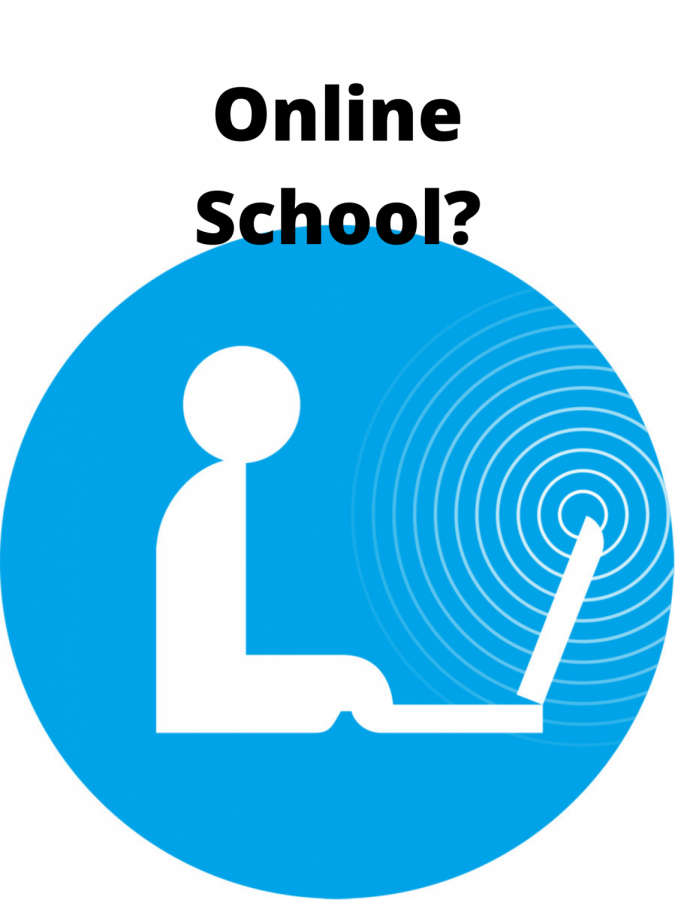Safety in Education
Before I go anywhere with this, I don’t see the point in not acknowledging the elephant in the room.
Most of us aren’t enjoying online school. It’s sometimes convenient to be at home during lunch and it’s nice to get extra sleep, but this is the thing: Nobody knows what they’re doing, teachers and students alike.
It is my perspective that some chaos revolving around our current situation is inevitable. We have all found ourselves in a situation where adaptation is crucial and inevitable, the only thing that’s plastic is its form.
What happens if we don’t go back in December? We just keep doing what we’ve been doing, which is undeniably the most health-conscious way of handling the situation (according to the CDC who sites online schooling as the lowest rick education plan and in school schooling as highest risk), seems to be trending towards working now that the administration and student body have settled in more. Whereas if we return in December, each student and administrator has to acclimate, not to school as it always was, but just as we are now an adaptation.
Starting over doesn’t seem like an ideal solution or way of adapting to what’s going on in the world right now, especially if we’re putting the health of students and faculty at risk. If you can imagine the structure of our school warped to fit in person covid regulations it doesn’t seem much simpler than what we have going on now. Spaced apart students, minimal interaction among peers, constantly wearing masks, and of course, covid outbreaks would all become part of daily academic life. This opposed to crashing computers and poor reception seems far more fragile, chaotic, and dangerous.
And what happens to students with health conditions or who just feel generally unsafe coming to school? Would they be subjected to a possibly lower standard of online schooling? If so, why would we hold students accountable when subjected to a standard of teaching they can’t control? The idea that more complications could arise with online learning is of course valid since complications are possible, but doesn’t stand up to the complications and risks of in-person schooling.
Finally, in addressing those who would advocate for in-person learning, any valid criticism would of course site the Center for Disease Control or other reputable sources who are the most reputable sources for the subject, and often they are sited. But what is sited are the descriptive elements of CDC studies or pieces. No one who tries to have a thorough understanding of a topic or is attempting to relay their own judgments should be taken seriously unless they are addressing the prescriptive elements of one of these pieces which will inevitably disagree with them. There is a materializing consensus of data saying we shouldn’t go back to school that needs to be recognized in order to actively address the problem in the safest and most reasonable way possible.
Virtual Nightmare
Teachers are trying, but the system is failing. If honor roll students are barely passing in the online format, what does this mean for the students who struggle face to face? Online school is a struggle due to navigation/technical difficulties, for many students the format makes the work extremely stressful, and the pandemic has caused an increase in mental health difficulties due to isolation. The online environment is making the isolation feel like prison.
Regardless of the online system each school uses, there are technical problems that come with it, system crashes, glitches, freezes, bandwidth issues, lags, etc. Buzz, and other online systems schools are using were quickly put together, and a main factor of tech crashes are because of low performance systems. This means too much traffic will overload the server that controls the site (https://www.exai.com/blog/websites-crash). After speaking with students, GLHS Junior Will Leisenring said “Zoom crashes every class” and Sophomore Austin Miller said “Yeah, quite a few (crashes). Sometimes break rooms would kick you out”. There are also issues pertaining to the format itself. Teachers cannot see when students are struggling. GLHS Algebra Teacher Melissa Goodrich said “I prefer in class, it is too difficult to help students when we are not in a classroom” and Band Director John Szczerowski said “it’s hard to teach it through the computer”. Students have difficulty with interactions with teachers and peers.
Difficulty interacting with the system and others causes a great deal of stress for students. A different schedule each day of the week is very confusing. There are days where questions cannot be asked and answered in real time. Students attempt to communicate during classes with teachers, but with the online format the teachers may not note or see that the student has a question. NPR (National Public Radio) recently found statistics show that parents are pulling their students out of public schools in favor of home or private schooling because they feel that the online curriculum is unsatisfactory. Jessica Diaz, mother and nurse, said “I don’t think [virtual school] is a sustainable option for our family at this point,” she told NPR. “For all of the burden of constant emailing, changes in schedules, assignments and submissions, etc., we feel the content of the education that is being delivered is far below our girls’ capabilities and not worth the trouble at this point.” Many parents are in a bind, especially special needs parents, because often they have full time jobs and also need to make the time to assist their children with online school/homework. It’s less online “school” and more online homework because that’s what it is. Students are not doing any part of it in an actual school building or lesson in a classroom. So it all is done at home.
The pandemic has isolated everyone. Mental health, suicide, and substance abuse cases have sky rocketed. KFF (Kraiers Family Foundation) said “In a KFF Tracking Poll conducted in mid-July, 53% of adults in the United States reported that their mental health has been negatively impacted due to worry and stress over the coronavirus. This is significantly higher than the 32% reported in March”. According to Stanford “The COVID-19 crisis has taken a psychological toll on people of all ages, but one group especially affected is teenagers. School closures and enforced social distancing have cut off many teens from major means of psychological support, putting them at higher risk of developing anxiety and depression”. Interaction and socialization are needed in everyday society. In an article from Oxford University regarding a study of mental health in teens and children during the pandemic, Tom Madders, Campaigns Director at YoungMinds, said,“This research suggests that many younger children have found it increasingly hard to cope as the lockdown period has gone on, which may be because of loneliness, fears about the coronavirus or a loss of the routines and support that come with school”. Not only is the fear a factor, but the homework is too. Students, especially teens, have work always due the next day or later that week. However, with multiple classes all assigning work, it eventually becomes a pile. Teens are staying up late just to get through one class. This is evidenced by students in class yawning, rubbing their eyes, dozing off, stretching, lack of focus, etc. Mental health is an everyday serious issue, as stated by GLHS Principal Wright “Student and Teacher mental health is my number one concern due to zero contact between each other”.
The other side claims that going back to school in person would lead to increased cases of COVID-19. Since, students would be in one room altogether. This is a valid reason, however, it’s harder to get out of a depression, anxiety, or substance abuse state, than COVID-19 illness since there is no cure for mental health other than time and help. Professor Julie Cerel from the University of Kentucky said in an interview for Medicalxpress, “There is some speculation the pandemic could lead to an additional 75,000 ‘deaths of despair.’ We know that suicide rates have not increased just yet, but it takes months for this data to be available. Additionally, we do know that calls to crisis lines have dramatically increased”. The risks and benefits have to be considered: mental well-being versus physical well-being. Why does it have to be a choice of one or the other?
Education has always faced challenges. 2020 has provided the greatest challenges yet. Despite tremendous effort on the part of the teachers, students, and parents, the online system is not working out. Online school was supposed to be temporary, starting in March two weeks to be exact. The best solution is to get school back in person, for the sake of everyone, especially future generations.

